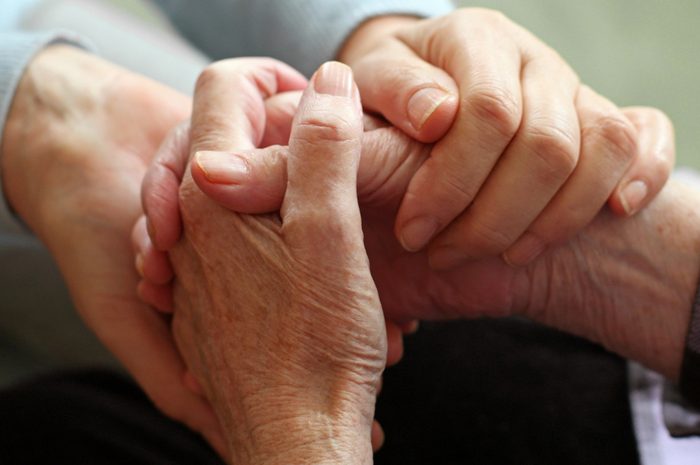
Suicides rates are rising
In Canada, approximately 11 people die by suicide in Canada each day and 4,000 deaths by suicide each year. Reversing the trend isn’t easy, as there’s no single cause for suicide. But knowing the suicide warning signs—which can vary from person to person—may help you save a life.

They may be affected by a high-profile death
There was an almost 10 percent increase in suicides—an additional 1,841 deaths—recorded in the United States in the four months following comedian Robin Williams’ death by suicide in 2014, according to a study in PLOS ONE. “That indicates just how powerful this kind of ‘contagion’ effect can be on a vulnerable person,” says child and adolescent psychiatrist Elizabeth Berger, MD, author of Raising Kids with Character. When people who may be trying to manage their depression see this person they admire taking his or her own life, they may see it as a way for them to escape their own misery. “The tragedy of Robin Williams’ death is that because he was a beloved public figure, people who were already suffering felt they had gotten permission to relieve their pain,” says licensed clinical social worker Susan T. Lindau, who is also an adjunct professor in the Department of Adult Mental Health and Wellness at the University of Southern California. “The voices decrying his death weren’t strong enough, persuasive enough, or prevalent enough to push those people experiencing suicidal thoughts to reach out for help.” If you’re having suicidal thoughts, don’t suffer in silence.

They may undergo drastic behaviour changes
“Any significant and unexplained changes in behaviour should at least be a cause for inquiry,” says Joel A. Dvoskin, PhD, a clinical and forensic psychologist who teaches at the University of Arizona College of Medicine in Tucson. “Significant negative changes are especially concerning.” However, behaviour changes don’t mean a person is going to kill himself, he says. “Ask empathic and respectful questions,” he recommends, adding that simply asking, “How are you doing?” is a good start. “When the person says or does anything that suggests or implies an intention to hurt themself or others, ask whether or not the person is intending to hurt themself or anyone else, stating it in the form of a question.” Doing so is neither disrespectful nor intrusive, he says.

They may withdraw from friends or social activities
Choosing to be alone and avoiding friends or social activities can be possible symptoms of depression. Any sign that indicates loss of interest in activities the person previously enjoyed is suspicious. “Young people, in particular, like to be around their friends,” says Daniel J. Reidenberg, PsyD, executive director of SAVE (Suicide Awareness Voices of Education). “So, when we see them pull away from peers, that’s concerning. Adults withdrawing from social activities, family activities, even going out after work with colleagues could be a sign that something is going on.” He says that withdrawal suggests the person is struggling with his or her thoughts and emotions. “They don’t want others to see that, so they avoid those situations,” he explains. “Withdrawal also gives them time to sleep more and ruminate about their situation, which indicates they’re not doing well.” (Here are some more tips for helping a friend or family member who’s struggling with depression.)

They make plans
Often, a person considering suicide will take steps to put his or her personal business in order. They might visit friends and family members or someone they haven’t seen in a long time. “For some, this might seem like an effort to reconnect,” says Reidenberg. “But it could be a way to make amends before an attempt.” They may draft a will or clean up their room or home. The person may give away possessions they previously loved because they don’t think they need them. Some people will write a note before attempting suicide.

They may lose interest in personal appearance
A person who is considering suicide might suddenly become less concerned about how he or she looks and start to neglect personal hygiene. “They’re more focused on survival than their appearance,” says Reidenberg. “They’re doing all that they can just to get through the day. Their appearance isn’t a priority.” They also have less interest in what others think of them, he adds. “They’re too miserable and too depleted to care about how they look,” says Eileen Kennedy-Moore, PhD, a New Jersey-based psychologist and the creator of the audio-video series Raising Emotionally and Socially Healthy Kids.

They may be bored by school, work, or hobbies
“When someone is depressed, nothing feels good or is interesting,” says Reidenberg. “Everything is hard, exhausting, and feels bland. Accomplishments and achievements (related to school, work, or interests) go away because you’re focused on your pain.” These activities feel pointless, says Kennedy-Moore: “They also don’t have the energy to try, and they no longer find pleasure in them.” (Read how acne can be a depression risk factor, especially in the first year it’s diagnosed.)

They may be preoccupied with death
People who exhibit this suicide warning sign aren’t simply looking for attention. Whether it’s a conversation with a friend, a writing or art assignment, or a journal entry, any expression of death should be taken seriously and seen as a red flag. They may also be researching about suicide online, asking around about how to buy a gun or where to get lethal drugs, or be interested in TV shows, movies, or songs with suicide themes. “Anyone talking about suicide—directly or indirectly—is a key warning sign,” says Reidenberg. “All statements about suicide are to be taken seriously, even if someone has said it multiple times over several years.”

They may start—or increase—drug or alcohol use
“Increased drug or alcohol use is not only an indicator of psychological suffering—it’s a common contributing cause of suicidal acts,” says Dr. Berger. Many people who feel anxious, agitated, or distressed turn to drugs and alcohol for relief, escape, and to feel calmer. They may not have previously abused drugs or alcohol, or they may start using more of them. But they take these substances to numb themselves and make themselves feel better. Drugs and alcohol impair judgment, and the person is more likely to make poor decisions and do something impulsive or high risk, says Reidenberg. These decisions may endanger themselves as well as others. “When someone is depressed, adding a substance to an already unhappy mind can lead him to do something fatal,” he says. “This is particularly true for someone who just starts to use alcohol or drugs when he hadn’t before, and now he’s depressed, too. This behaviour change is a warning sign he isn’t doing well.”

They may have extreme mood swings
Excessive moodiness can be a symptom of depression and a major risk factor for suicide. Depressed individuals can go from extreme sadness to irritability to intense anger. These mood swings might be out of character, too—the person may look different and sound different, says licensed clinical psychologist Kevin Gilliland, PsyD, executive director of the outpatient counseling service Innovation 360 and author of Struggle Well Live Well: 60 Ways to Navigate Life’s Good, Bad, and In-Between. “They’re not ‘themselves,'” he says. Mood swings can be a sign that they’re emotionally and psychologically unstable, adds Reidenberg: “If these go on too long and without treatment, they can lead to impulsive behaviours that are risky.” (Learn what psychologists wish people knew about happiness.)

They may feel like they’re a burden to others
The person might feel like they are a burden to family, friends, or society. He or she may feel guilty about letting people down. They may say things like, “Everyone would be better off without me,” or “Things will be easier without me here.” Gilliland says, “Be attentive to statements like that, and don’t be afraid to step in and tell them they’re not being a burden.”

They may have suffered a current loss, crisis, or problem
“Many people who attempt suicide are responding to real-life issues that appear to be insurmountable,” says Dr. Berger. Social humiliation or relationship breakups are also often the stimulus for suicide attempts, she says, as well as serious physical illness, loss of livelihood, homelessness, and other life losses. Also look out for people saying they feel trapped or in a hole they can’t get out of. “When people begin feeling a job, financial situation, or relationship is unbearable, it’s not unusual for them to become depressed or be constantly thinking about the hopelessness of the situation,” says Gilliland. “At times like that, we sometimes make up a story that the rest of our lives will be like this and we can’t fathom living like this.”

They may have subtle signs of depression
Depression signs vary. They can include difficulty sleeping, weight loss or gain, guilt, unusual worries, irritability, sadness, anger, or hopelessness. “Of course, these are common signs among ordinary people, and not everyone with these signs is suffering from depression,” says Dr. Berger. But if these signs last more than a week or two, that’s a red flag that the person needs help. Note that lots of people are depressed and most don’t kill themselves, says Dvoskin. “However, even if they aren’t intending to kill themselves, people who are seriously depressed usually need help,” he says. “It might make the person angry, but he’ll be alive.”

They may talk about suicide
Not everyone who is considering suicide will say it out loud. And not everyone who threatens suicide will follow through with it. “However, many people who commit suicide do have a history of behaviours that indicate the threat of self-harm,” says Dr. Berger. “Every threat of suicide should be taken seriously, even threats that seem harmless, exaggerated, or overly dramatic.”

Get help
If you or someone you know is struggling with depression or has had thoughts of self-harm or suicide, get help. The National Suicide Prevention Lifeline (1-800-273-8255) provides 24/7, free, confidential support for people in distress, as well as best practices for professionals and resources to aid in prevention and crisis situations.

Err on the side of action rather than inaction
In many cases, suicide can be prevented by being alert to the suicide warning signs and intervening before the person can act. People with support from friends and family and who have access to mental health services are less likely to act on their impulses than those who are isolated. Take it seriously if someone you know is threatening suicide, says the Cleveland Clinic. Don’t leave the person alone. Ask the person to give you any weapons he or she might have. Take away sharp objects or anything they might use to hurt themselves. Bring them to an emergency room or call 911. “Remember that you’re not a mental health professional or a crisis-response worker,” says Phyllis Alongi, clinical consultant at the Society for the Prevention of Teen Suicide. “If you know a loved one is in immediate danger, call 911 right away.”
Next, find out what you should never say to someone with depression.
